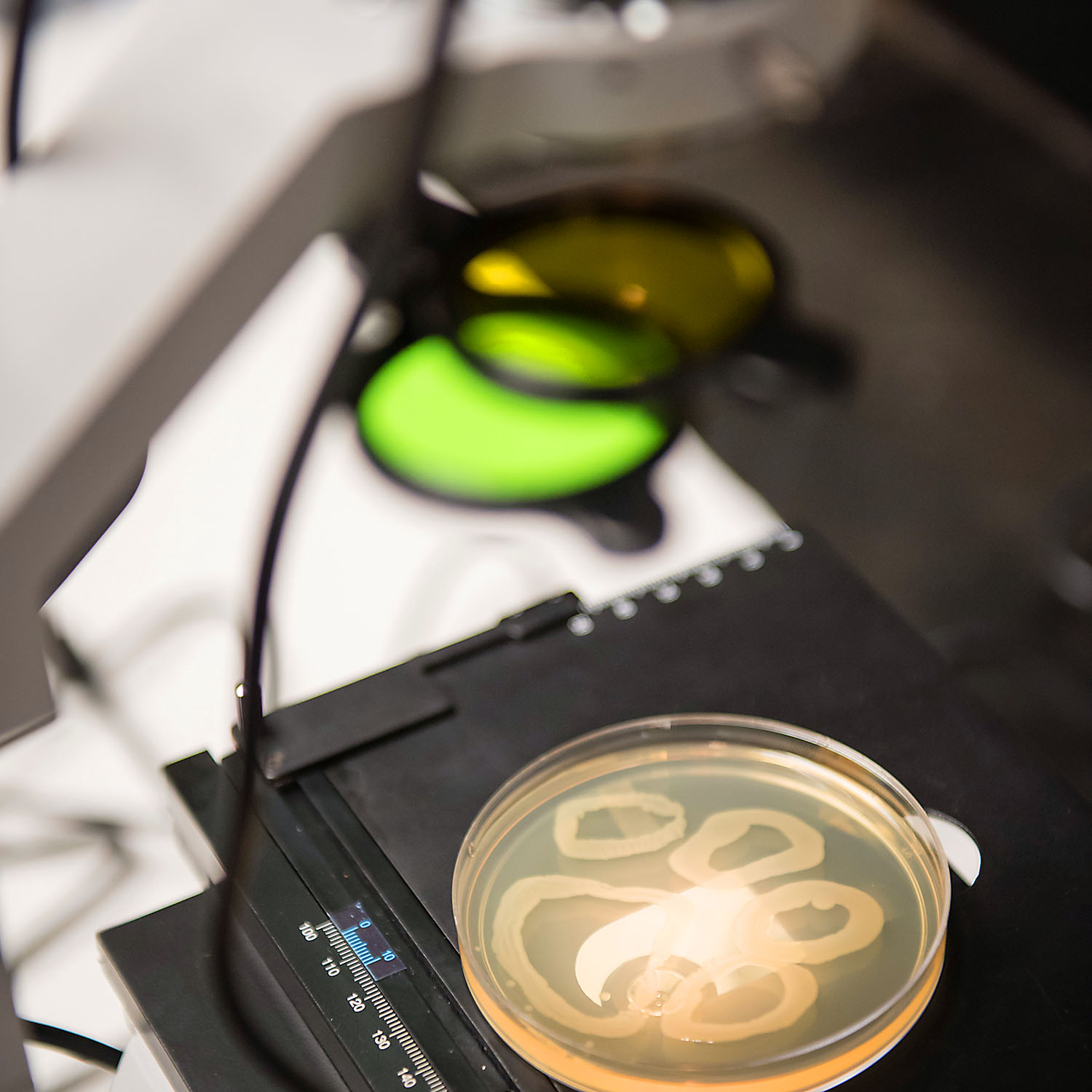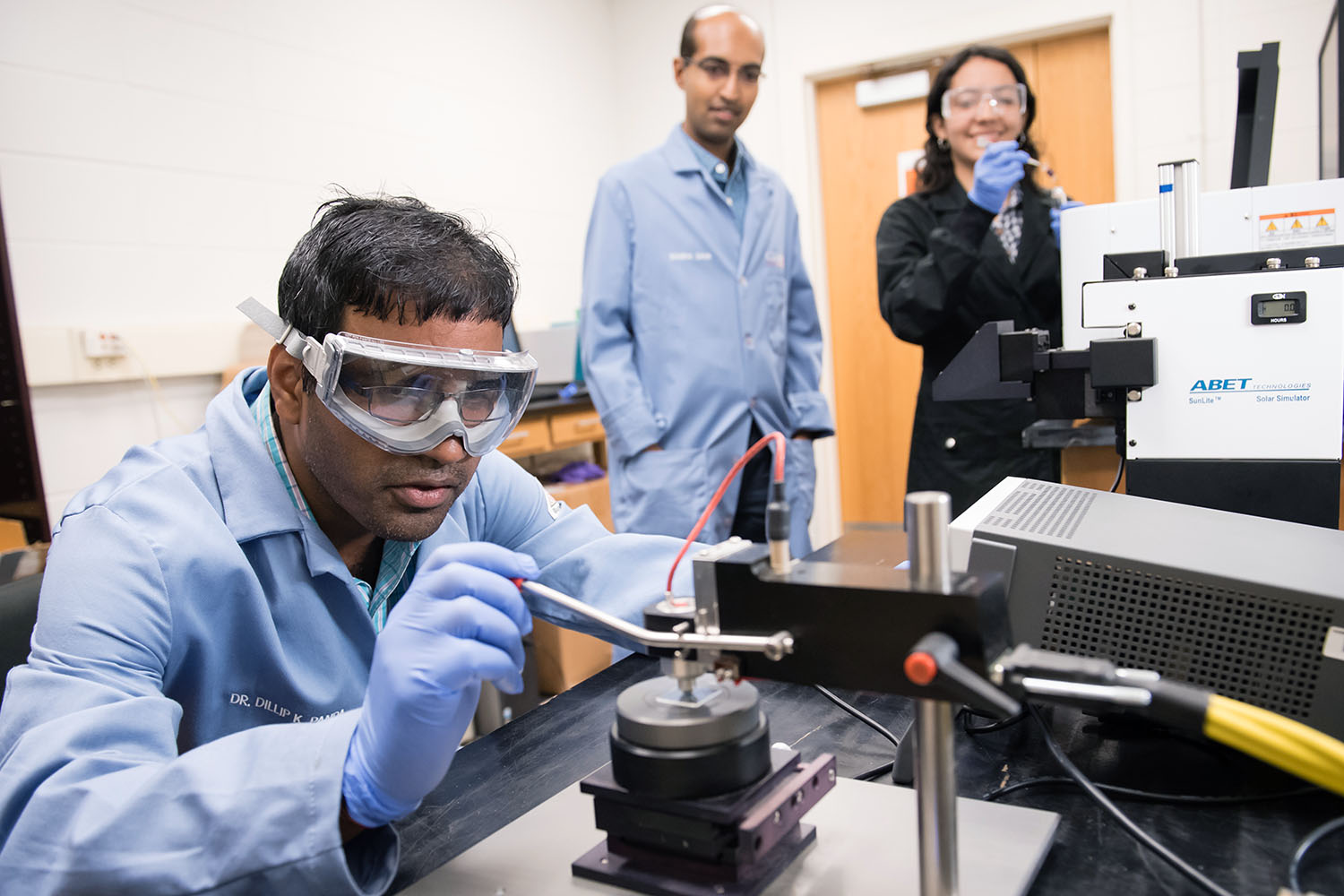Graduate Studies Overview
Chemistry
Clemson University is a public, Carnegie Research 1 institution of 28,700 undergraduate and graduate students located in the foothills of the Appalachian Mountains in Upstate South Carolina. Clemson is a comprehensive research university with a traditional emphasis on science and engineering. The Department of Chemistry is a midsize graduate program with 24 research faculty and approximately 120 graduate students. The department has faculty members with research efforts in many interdisciplinary areas of chemistry, with strengths in advanced materials, chemical biology, computational chemistry, nanoscale materials and solid-state chemistry. The graduate stipend for the upcoming academic year will be $27,000 in return for teaching and research duties, with most of the tuition charges and healthcare fees covered by the department. Supplementary fellowships are also available to outstanding candidates.
The Department of Chemistry has an admission process that considers many aspects of an applicant’s preparation, including research experience, letters of recommendation, research and other accomplishments, and personal goals. Submission of Graduate Record Examination (GRE) scores is not required. For those applicants who have received undergraduate degrees from non-U.S. accredited institutions, inclusion of certified results on the GRE and certified undergraduate/graduate transcripts (e.g., WES) is strongly encouraged as a positive contribution to the portfolio. Admission decisions will take place on a rolling basis, with the deadline for applications being December 1. We are always looking for motivated students to join our program.
If you are interested in coming to Clemson as a graduate student, please check the program descriptions for the Ph.D. or M.S. degrees.
Veterans and persons from traditionally underrepresented groups are strongly encouraged to apply. There is no fee to apply to the program.
Letter from the Chair
 Over the past century, increasing attention has been given to science and technology as cornerstones of our national economic competitiveness, human welfare and security. Chemistry, the “central science,” has assumed a fundamental role in the new economy that has evolved. Advanced study in chemistry is more valuable and important than ever.
Over the past century, increasing attention has been given to science and technology as cornerstones of our national economic competitiveness, human welfare and security. Chemistry, the “central science,” has assumed a fundamental role in the new economy that has evolved. Advanced study in chemistry is more valuable and important than ever.
The graduate chemistry program at Clemson prepares M.S. and Ph.D. students for a variety of challenging careers in critical science and technology areas such as advanced materials, fuel cells, drug design and synthesis, waste remediation, energy, nanoscience, nanotechnology, and surface chemistry. Faculty perform cutting-edge research in some of the finest research facilities in the Southeast. The program is well balanced, flexible and suited for students from a variety of backgrounds. Clemson University provides students with both an excellent campus and academic environment for advanced study. Faculty commitment extends to personal involvement in the research activities of our students.
Choosing a graduate school is a very important decision, and we invite you to examine Clemson’s graduate education and research opportunities in chemistry. Use this website to explore our University, its facilities, the campus environment, our chemistry faculty and their research. We hope that it will help you by answering many of your questions about graduate study. Finally, we hope that you will choose Clemson University chemistry for your graduate studies.
If you wish to learn more about our program, I urge you to call toll-free at 888-539-8854 (in the U.S. and Canada) or 864-656-3095 (outside the U.S. and Canada), or email us at chemistry@clemson.edu. We would like to hear from you and welcome an opportunity to have you visit our department.
Sincerely,

Bill Pennington, Ph.D.
Professor and Chairman
Clemson University Department of Chemistry
Graduate Program Options
Master of Science
The M.S. degree in chemistry provides a course-intensive degree with the option to perform research focused on analytical, inorganic, organic and physical chemistry. Research areas also include bio-organic chemistry, polymer chemistry, materials chemistry and chemical physics. Students may earn the degree through a non-thesis option or through a combination of graduate coursework and research.
Doctoral Program
The Ph.D. degree in chemistry is a research-intensive degree with projects focused on aspects of analytical, inorganic, organic and physical chemistry. Research areas also include chemical biology, polymer chemistry, materials chemistry and chemical physics. Entering Ph.D. students are typically appointed as teaching assistants, with an annual stipend of $27,000.
Resources for Graduate Students
Current and Accepted Students
If you are a current graduate student, or have received acceptance to the graduate program, the following accordions offer information and resources that may be helpful.
-
The Graduate School
Current graduate students may find the following links containing University policies helpful:
- “Clemson University Graduate School Policies & Procedures” handbook
- The Graduate School
- Graduation deadlines
- Graduate School forms
For general information about the Clemson University Graduate School, as well as the most current degree requirements and course listings, visit the Records and Registration page.
-
Graduate Student Forms
The following forms are intended for current graduate students:
-
Working in the Chemistry Department
The Department of Chemistry encourages scholarship and fellowship among students, faculty and staff. A departmental seminar program sponsors weekly visits by scientists from other universities and research laboratories throughout the United States and the world. These seminars provide opportunities for faculty and students to meet and discuss science with the visitors. This program is supplemented by a student seminar program in which chemistry graduate students present their work to the department.
Social activities include the department’s fall picnic, spring golf tournament and annual awards luncheon.
-
Clemson Life: Housing, Health, Organizations
Study under faculty dedicated to excellence. Learn as part of a close-knit graduate community. Your time in graduate school will be a time of intense professional development, and it will be a life phase that you will never forget. This section provides information on important issues that relate to your Clemson chemistry graduate student experience. Of course, it’s impossible to anticipate all of the issues that might arise, so contact the department if you have questions.
Housing
Most graduate students select off-campus housing, for which a variety of options in many cost ranges are available within a short walk or drive from campus. Clemson has an excellent free local bus system that provides frequent service to most local apartment complexes and campus buildings. Information on local housing changes rapidly, so contact the Department of Chemisty graduate office for up-to-date information. More information about housing is also available on the Clemson Home website.
Insurance and Health Services
Clemson University requires all full-time (nine hours or more), on-campus graduate students to have health insurance coverage. All international graduate students are required to have health insurance. This policy is administered by Redfern Health Center as a “hard-waiver program.” All full-time, on-campus students are enrolled in the University plan unless they present evidence of acceptable alternative coverage to RHC’s Office of Student Insurance before the semester begins. One waiver is valid for a year. To partially offset some of the health insurance premium costs associated with this requirement, Clemson provides all graduate assistants who purchase health insurance from Clemson with an annual, nonrefundable, non-transferable health insurance subsidy.
Find out more on the Redfern Health Center website.
Graduate Student Organizations
Clemson has several campus organizations that cater specifically to graduate students. You may find information on many of these organizations on the Division of Student Affairs website.
The Graduate Student Government serves as a liaison between graduate students and the rest of the University community, and many International Student Organizations are focal points for the international student communities and cultures on campus. GSG also supports a travel grant program for graduate students and encourages graduate students to participate in many campus activities.
The Chemistry Graduate Student Organization was formed to promote camaraderie among graduate students, create an enriching environment within the department and provide a forum for graduate students to discuss departmental issues. To learn more about CGSO, visit its Facebook page.
Local and Regional Resources
For additional information on Clemson and Upstate South Carolina, follow these links:
Prospective Students
The Clemson University Department of Chemistry offers programs of study leading to Master of Science and doctoral degrees. Each program has specific requirements. Most students who apply to the Clemson graduate chemistry program have completed a B.S. or B.A. undergraduate degree in chemistry, or have acquired the equivalent background. Apply now, or learn more about the program through the links below.

Why Choose Clemson?
What Do Our Students Say About the Department of Chemistry?
“I knew that the time I was going to spend in graduate school was going to be very challenging. Something i really looked for was a department that would have a good support system, a collaborative environment and a family feel. That rings true for the Clemson Department of Chemistry, where we truly are a very collaborative environment, and a diverse environment as well. The faculty and students both look forward to the success of all of us.” — Tatiana Estrada-Mendoza, graduate student
Watch the VideoGraduate Student Financial Support

There are several types of financial support available for students in graduate programs. Each type of support is awarded to qualified students on a competitive basis. Continuation of all support is based upon satisfactory progress towards a degree.
All students in the doctoral program are supported on either teaching assistantships or research assistantships during the full course of their studies. Students in the first year of study are normally supported as teaching assistants in undergraduate laboratory sections. Research assistantships are often available to support students working on funded research projects.
Students in the Master of Science program typically join the program with their own funding — such as a contract from a company, the military or other organization — but may receive financial assistance from the department under specific circumstances.
Department and University fellowships that can supplement the stipend for well-qualified applicants are also available. Students who are not native English speakers must pass a locally administered spoken English exam (the VEST) before being certified to teach laboratory sections. It is expected that such students will pass the test by the end of the first year of study.
For current information on graduate tuition and fees, visit the Clemson University Tution & Fees webpage.

